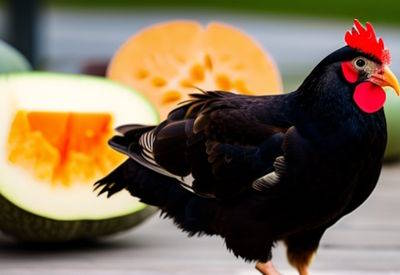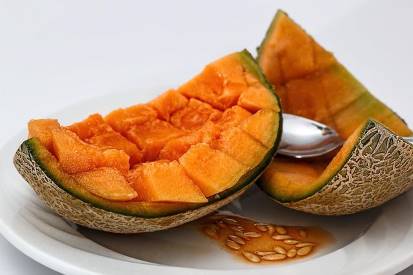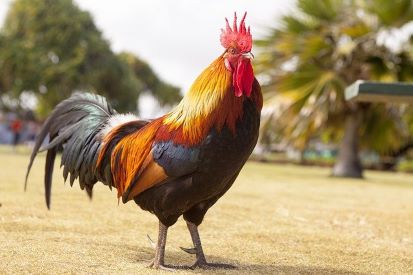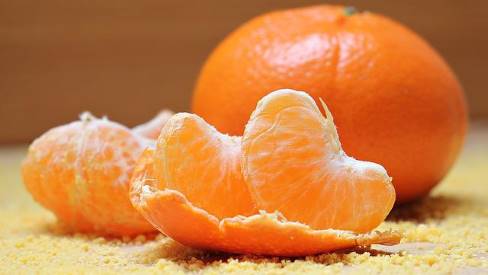Can chickens eat cantaloupe? The answer is yes! Cantaloupe is a nutritious and delicious treat for chickens. This sweet and juicy melon is full of vitamins, minerals, and water that chickens need to stay healthy. It’s also a great source of fiber which helps keep their digestive system healthy.
When feeding cantaloupe to chickens, it’s important to cut the melon into small pieces that are easy for them to digest. You can also add the seeds and rinds as a bonus treat, though they should not make up the majority of your chicken’s diet. Be sure to discard any pieces that have molded or gone bad.
This article will discuss the health benefits of cantaloupe for chickens, how to feed it to your birds, and some common questions about feeding melons.

Can chickens eat cantaloupe?
The first question that comes to mind when considering any food item for chickens is whether or not it is safe. The good news here is that cantaloupe can be eaten by chickens safely as long as it has been washed, cut into small pieces, and served in moderation.
Cantaloupe is full of vitamins and minerals, making it an excellent snack for chickens. Specifically, cantaloupes contain vitamins A, B6, C, folate, potassium, magnesium, copper, and more! Because of their high water content, cantaloupes are also great for hydration on hot days.
Chickens can eat all parts of the cantaloupe – including the rind! The rind contains additional nutritional benefits, so don’t be afraid to let them chow down on this part of the melon. Of course, wash off any dirt or pesticides before feeding your flock the rind.
The best way to serve this sweet treat is to cut it into bite-sized pieces so that your birds can enjoy their snack without making a mess in their run or coop.
[ChickenAffiliate]
The benefits of eating cantaloupe for chickens
There are a lot of benefits to feeding chickens cantaloupe. This delicious and nutritious fruit is a great way to give your flock the nutrition they need to stay healthy and active. Here we will discuss the five biggest benefits of adding cantaloupe to your chickens’ diet.
Vitamin A
Cantaloupe is packed full of essential vitamins, including vitamin A. This vitamin is important for helping chickens keep their eyesight sharp and aiding in digestion, bone growth, and egg production.
Minerals
Besides being high in vitamin A, cantaloupe contains various beneficial minerals for chickens, such as calcium, magnesium, phosphorus, iron, zinc, and potassium. These minerals help regulate blood pressure levels in chickens and boost their immune system.
Water Content
Cantaloupe is mostly water, so it’s a great way to ensure your chickens stay hydrated during hot summer months when they don’t have access to fresh water every day or two. It also helps them avoid dehydration-related illnesses like egg peritonitis which can be fatal if left untreated.
Fiber Content
Cantaloupe offers an excellent source of dietary fiber that helps keep the digestive system running smoothly by promoting regular bowel movements and reducing constipation problems in chickens. It can also help balance out other foods in their diet that may not contain enough fiber.
Nutritional Density
Finally, cantaloupes provide a nutritional punch with very few calories, making them an ideal snack for chickens that need to watch their weight but still get the nutrition they need from other food sources like grains or vegetables. They also contain natural sugars that provide an energy boost when needed.
Things to watch out for when feeding cantaloupe to chickens

Chickens love cantaloupe! This sweet and juicy treat is a fun way to mix up your chickens’ diets and give them something special. But there are a few things to remember when feeding cantaloupe to your feathered friends. Read on for our guide to feeding cantaloupe to chickens.
Start with Small Portions
Cantaloupe is a high-sugar fruit, so it’s best not to overindulge your chickens. Start with small portions of the melon cut into wedges or cubes and observe how your chickens react before giving them more. You may also want to reduce the amount of other sugary treats you offer your chickens when adding cantaloupe into their diet.
Offer Cantaloupe in Moderation
As mentioned above, cantaloupe is quite high in sugar, so it’s important not to overindulge your chickens with this treat. Offer them cantaloupe no more than two or three times per week and monitor their reactions closely after each feeding session. If you notice that one of your birds isn’t feeling well after eating a piece of melon, refrain from feeding them any for a few days until they’re back up and running again.
Watch for pesticides
Cantaloupe grown in commercial farms may have been exposed to pesticides, so it’s important to always wash the melon thoroughly before giving it to your chickens. You may also want to stick to organic varieties of cantaloupe if you can find them, as these will be free of any chemical additives.
How often should chickens eat cantaloupe?
Feeding chickens cantaloupe is a great way to give them a nutritional boost now and then. As with all fruits and vegetables, they should only ever make up a small portion of their diet – no more than 10%.
While chickens can safely eat cantaloupe daily, it’s generally better to only give them this sweet treat occasionally, ensuring they get plenty of nutritious grains. Doing this helps keep chickens healthy and strong so they can lay eggs at optimal levels.
How to prepare cantaloupe for feeding to chickens

Whether you have a small backyard flock or a large commercial barn of chickens, adding variety to their diets is important to keeping them healthy and content. Let’s look at how to prepare cantaloupe for feeding to chickens.
Wash First
The first step when preparing cantaloupe for your chickens is to wash it thoroughly. This will not only help remove any dirt or bacteria on the surface of the fruit but also any pesticides that may have been used on it. Washing the cantaloupe ensures that your chickens are getting safe food and reduces their risk of becoming ill.
Chop into Small Pieces
Once you have washed the cantaloupe, it’s time to chop it into small pieces so that it’s easier for your chickens to eat. If you’re using a whole melon, you can easily cut it in half before chopping it into smaller cubes or slices. This will ensure that no piece is too big for your feathered friends to manage.
No Need to Peel Them
You don’t need to peel the cantaloupes before feeding them to your chickens. Leaving the skin on can be beneficial because they provide extra fiber and nutrients that can help keep their digestive systems happy and healthy. However, if you peel the melons before feeding them, remove all the rinds so they don’t get stuck in your chicken’s crop.
Remove Uneaten Pieces
Don’t leave uneaten pieces of melon lying around outside; this will attract pests like rats and mice, and it could also lead to bacterial growth if left out too long in warm weather. After feeding your chickens their delicious cantaloupe snack, collect any leftover pieces and discard them properly.
Can baby chickens eat cantaloupe?
Cantaloupe is a great food for baby chicks. It is particularly rich in water, which can help with hydration; however, you must be mindful of the water content in relation to the growth of your birds.
Generally speaking, baby chickens should not be given as much cantaloupe as adult chickens since their bodies are still developing and need more consistent nutrition that might come from other sources, such as crickets and mealworms.
Furthermore, be sure to slice or mash the fruit into sufficiently small pieces so that it will be easy for the newly hatched chicks to digest – no bigger than half an inch in size should do the trick.
What other fruits can chickens eat?

You’ve already discovered that chickens love cantaloupes. But did you know that they can enjoy many other fruits too? Read on to find out what tasty treats your chickens will love!
Oranges
These citrus fruits are a great source of vitamin C for your chickens and have a yummy sweet-tart flavor. Just make sure to peel the oranges before giving them to the chickens, as their delicate digestive system can’t handle the bitter rinds.
Read More: Can Chickens Eat Oranges? 5 Important Benefits
Watermelon
Your chickens will go crazy for watermelons! They have an irresistible sweetness, and watermelons also contain lycopene, a powerful antioxidant. Cut the watermelon into small, bite-sized pieces so your chickens can easily enjoy it.
Read More: Can Chickens Eat Watermelon? 6 Fantastic Benefits
Lemons
Like oranges, lemons are a good source of vitamin C for your feathered friends. They also have a tart flavor that chickens seem to love. Just remember to cut the lemons into small pieces and remove any seeds before feeding them to your chickens.
Read More: Can Chickens Eat Lemons? 4 Excellent Benefits
Grapefruit
Grapefruits may be tarter than oranges and lemons, but they still provide a good source of vitamin C and other nutrients. As with all citrus fruits, peel off the rind before offering it to your feathered friends.
Read More: Can Chickens Eat Grapefruit? 4 Awesome Benefits
Melon
Chickens love melons – both inside the fruit and out! Melons are packed with essential vitamins and minerals such as vitamin A, potassium, fiber, and magnesium. Plus, they’re so juicy that your chicks will be licking their beaks in anticipation. Remember to remove any visible seeds from the melon before giving them to them.
Can chickens eat cantaloupe – final thoughts
Can chickens eat cantaloupe? Yes! Not only is this juicy fruit safe for chickens in small doses, but it also provides lots of essential vitamins and minerals that will help keep them healthy and hydrated during those hot summer months.
Remember though – this should only be treated as a special treat, not something that should replace their regular feed routine. If you plan on giving your flock some delicious melon this summer, make sure to give them in moderation.
Related Articles:
